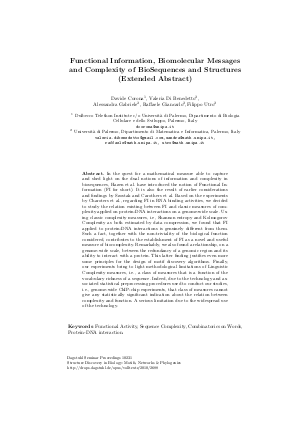Functional Information, Biomolecular Messages and Complexity of BioSequences and Structures
Authors Raffaele Giancarlo, Davide Corona, Valeria Di Benedetto, Alessandra Gabriele, Filippo Utro
-
Part of:
Volume:
Dagstuhl Seminar Proceedings, Volume 10231
Part of: Series: Dagstuhl Seminar Proceedings (DagSemProc) - License:
 Creative Commons Attribution 4.0 International license
Creative Commons Attribution 4.0 International license
- Publication Date: 2010-08-23
File

PDF
DagSemProc.10231.6.pdf
- Filesize: 0.89 MB
- 13 pages
Document Identifiers
Subject Classification
Keywords
- Functional activity
- sequence complexity
- combinatorics on words
- protein-DNA interaction.
Metrics
- Access Statistics
-
Total Accesses (updated on a weekly basis)
0Document
0Metadata
Abstract
In the quest for a mathematical measure able to capture and shed light on the dual notions of information and complexity in biosequences, Hazen et al. have introduced the notion of Functional Information (FI for short). It is also the result of earlier considerations and findings by Szostak and Carothers et al. Based on the experiments by Charoters et al., regarding FI in RNA binding activities, we decided to study the relation existing between FI and classic measures of complexity applied on protein-DNA interactions on a genome-wide scale. Using classic complexity measures, i.e, Shannon entropy and Kolmogorov Complexity as both estimated by data compression, we found that FI applied to protein-DNA interactions is genuinely different from them. Such a fact, together with the non-triviality of the biological function considered, contributes to the establishment of FI as a novel and useful measure of biocomplexity. Remarkably, we also found a relationship, on a genome-wide scale, between the redundancy of a genomic region and its ability to interact with a protein. This latter finding justifies even more some principles for the design of motif discovery algorithms. Finally, our experiments bring to light methodological limitations of Linguistic Complexity measures, i.e., a class of measures that is a function of the vocabulary richness of a sequence. Indeed, due to the technology and associated statistical preprocessing procedures used to conduct our studies, i.e., genome-wide ChIP-chip experiments, that class of measures cannot give any statistically significant indication about complexity and function. A serious limitation due to the widespread use of the technology. References J.M. Carothers, S.C. Oestreich, J.H. Davis, and J.W. Szostack. Informational complexity and functional activity of RNA structures. J. AM. CHEM. SOC., 126 (2004), pp. 5130-5137. R.M. Hazen, P.L. Griffin, J.M. Carothers, and J.W. Szostak. Functional Information and the emergence of biocomplexity. Proc. of Nat. Acad. Sci, 104 (2007), pp. 8574-8581. J.W. Szostak. Functional Information: molecular messages, Nature, 423 (2003).
Cite As Get BibTex
Raffaele Giancarlo, Davide Corona, Valeria Di Benedetto, Alessandra Gabriele, and Filippo Utro. Functional Information, Biomolecular Messages and Complexity of BioSequences and Structures. In Structure Discovery in Biology: Motifs, Networks & Phylogenies. Dagstuhl Seminar Proceedings, Volume 10231, pp. 1-13, Schloss Dagstuhl – Leibniz-Zentrum für Informatik (2010)
https://doi.org/10.4230/DagSemProc.10231.6
BibTex
@InProceedings{giancarlo_et_al:DagSemProc.10231.6,
author = {Giancarlo, Raffaele and Corona, Davide and Di Benedetto, Valeria and Gabriele, Alessandra and Utro, Filippo},
title = {{Functional Information, Biomolecular Messages and Complexity of BioSequences and Structures}},
booktitle = {Structure Discovery in Biology: Motifs, Networks \& Phylogenies},
pages = {1--13},
series = {Dagstuhl Seminar Proceedings (DagSemProc)},
ISSN = {1862-4405},
year = {2010},
volume = {10231},
editor = {Alberto Apostolico and Andreas Dress and Laxmi Parida},
publisher = {Schloss Dagstuhl -- Leibniz-Zentrum f{\"u}r Informatik},
address = {Dagstuhl, Germany},
URL = {https://drops.dagstuhl.de/entities/document/10.4230/DagSemProc.10231.6},
URN = {urn:nbn:de:0030-drops-26884},
doi = {10.4230/DagSemProc.10231.6},
annote = {Keywords: Functional activity, sequence complexity, combinatorics on words, protein-DNA interaction.}
}
